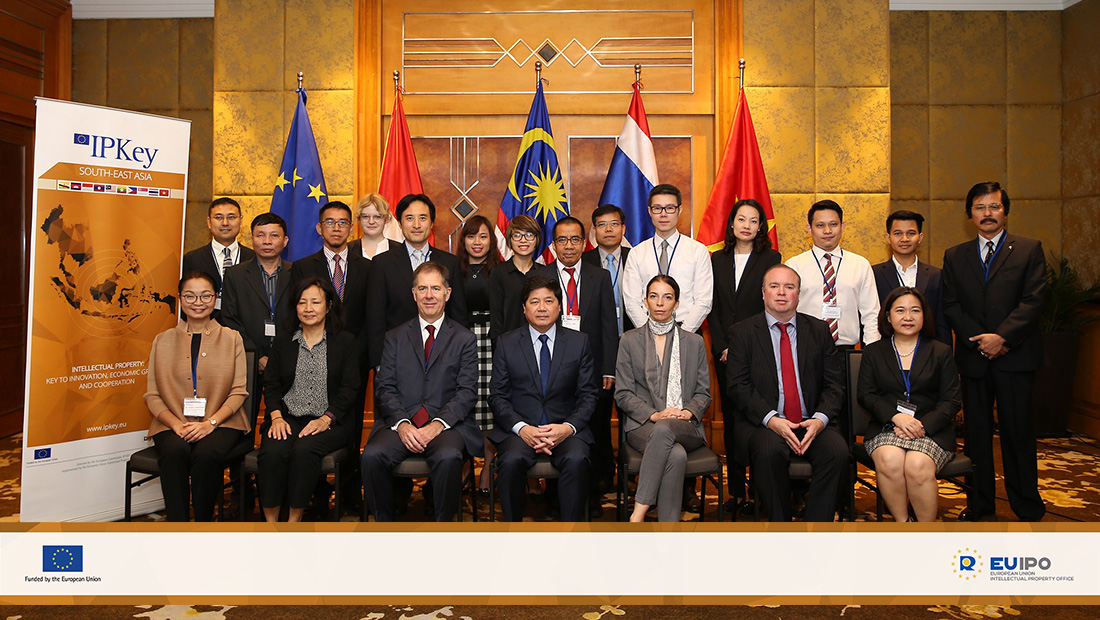Southeast Asian officials join study visit on plant variety protection in Viet Nam
IP Key SEA organised a study visit on plant variety protection (PVP) in Viet Nam on 5-6 November for officials from Indonesia, Malaysia, and Thailand. Co-organised by the Plant Variety Protection Office (PVPO), Ministry of Agriculture and Rural Development of Viet Nam, the activity highlighted the benefits of a strong PVP system and of membership in the International Convention for the Protection of New Varieties of Plants (UPOV Convention).
Opening the activity, Vice Minister Dr. Le Quoc Doanh, Ministry of Agriculture and Rural Development, and Head of Trade and Economics Section Miriam Garcia Ferrer, EU Delegation to Viet Nam, detailed the benefits of UPOV to Viet Nam.
Ms. Ferrer noted, “studies have shown that Viet Nam has greatly benefited from UPOV membership. Viet Nam’s experience can serve as a benchmark for other countries in the Southeast Asian region, taking into account that plant variety protection is an important element of free trade agreements with the EU.” She highlighted that through the IP Key Southeast Asia project, the EU will continue to help upgrade and improve IP rights in the region.
Vice Minister Dr. Le Quoc Doanh emphasized the impact of UPOV membership to Viet Nam’s economic development. Since its inception, more than 600 certificates have been granted to new plant varieties. “Most of the granted certificates are of those varieties with good characteristics and high economic value that help Vietnamese farmers increase their incomes thanks to increased exports at high prices,” he noted. He also stated that the membership of Viet Nam in UPOV has spurred private sector investment in the development of new plant varieties and the establishment of their own plant breeding research centers.
A visit to the Vietnam National Seed Group (Vinaseed) in Ba Vi underlined the importance of PVP protection in stimulating research and development in the sector. Vinaseed Director of National Seed Centre for Research, Application and Technology Transfer, Nguyen Dinh Trung, outlined the group’s PVP strategy, including the further development and registration of pure rice species, as well as new varieties of corn and vegetables. He also emphasised that they do not go into production before securing registration for their new plant varieties.
Just outside of Hanoi, local plant breeder Nguyen Viet Ha showed how a farmer like him has evolved into a plant breeder. Providing samples of a new pomelo variety, Mr. Ha explained the premium qualities of his pomelo in terms of taste, texture, and colour. He noted that the registration of his new variety has allowed him to sell his pomelo at twice the price of the ordinary product.
A meeting with representatives at the Tu Liem Distinctiveness, Uniformity and Stability (DUS) Testing Station rounded off the study visit. DUS testing determines whether a new variety is sufficiently different from existing varieties of the same species, an important prerequisite for new plant variety registration. The Tu Liem station is one of four such facilities in Viet Nam.
During the presentations that preceded the study visit, UPOV Vice-Secretary General Peter Button explained the benefits of UPOV membership to farmers and plant breeders. His presentation was bolstered by Mr. Nguyen Thanh Minh, Director of the Viet Nam’s Plant Variety Office, who discussed the benefits reaped by Viet Nam after accession to UPOV, including increased applications for plant variety protection, investment in research and development by the private sector, and higher incomes for farmers. Further support was provided by Mr. Nguyen Van Bao, Public Relations Director of Dalat Hasfarm, who stated that the plant variety registration system has increased access to high quality varieties.
Community Plant Variety Office (CPVO) President Martin Ekvad provided an overview of the community plant variety rights system in the EU, and the role of the CPVO in ensuring protection for new varieties developed by plant breeders.
Viet Nam is well placed to host the study visit as it benefitted tremendously after joining UPOV in 2006. A strong PVP system is considered useful for economic development as it fosters increased plant breeding activity, diversification of available plant varieties, and heightened industry competitiveness, among other benefits.
